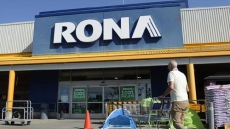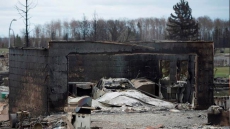VANCOUVER — When Ben Campbell heard Earls was switching to Certified Humane beef from the U.S., he had a different reaction than many Alberta ranchers.
The 32-year-old raises grass-fed cattle without added hormones at his ranch in Black Diamond, about 60 kilometres southwest of Calgary. He sells directly to customers, often inviting them to visit the rolling hills where his animals graze.
To Campbell, Earls' decision was a response to a trend he had seen firsthand: growing consumer demand for ethical meat. And though Earls backtracked after a social media slaughtering, Campbell said the beef industry can learn from the controversy.
"People care about where their food comes from and they should," he said. "The average Alberta farmer is proud of the way he produces his beef or she produces her beef, and we want to showcase it. I think a lot of people will be happy to have a certification to show the high standard."
Alberta ranchers say Canada is a leader in animal welfare standards. But companies like Earls and McDonald's are increasingly finding that customers, especially millennials, want proof that meat was raised humanely — forcing the industry to embrace certification programs it once resisted.
"We've got to get more comfortable as an industry with those verifications and audits," said Bob Lowe, chairman of Alberta Beef Producers.
"We have been doing things very well and we've been adapting to the science as it comes along, but it's just the independent nature of cattle producers. They just don't want people snooping around."
Certified Humane is a U.S.-based trademark with standards enforced through annual inspections. Some Canadian ranches have the designation, but when Earls couldn't find enough supply in Canada, it switched to buying exclusively in the United States.
The Canadian industry balked, insisting that local ranchers already met similar standards under national codes of practice. However, the codes of practice are guidelines that aren't enforced through inspections.
Ranchers have had to turn to third-party programs for verification, like Certified Humane or the made-in-Canada option SPCA Certified. Animal welfare advocates say it should be the job of government to inspect farms for humane treatment.
"What the Earls situation really brings to the forefront is that this industry isn't being regulated, and consumers want the regulation," said Anna Pippus, a lawyer with Animal Justice, a legal group that fights for the rights of animals.
Rob McNabb of the Canadian Cattlemen's Association pointed out cattle are inspected during transportation for slaughter, and the final product is inspected at the meat packing plant. Provincial SPCA officers inspect farms when they receive cruelty complaints.
"There's no need (for regular on-farm inspection by government)," said McNabb. "At the end of the day, nobody is questioning the value or the safety or the wholesomeness of Canadian beef."
The association is set to unveil its own audit-enforced program called Verified Beef Production Plus in June. The Canadian Roundtable for Sustainable Beef is crafting standards for animal welfare, sustainability and biosecurity that will become part of the program.
Sylvain Charlebois, a professor in food distribution and policy at Dalhousie University, said ethical meat is more important to millennials, who now outnumber boomers in the marketplace.
"It's way beyond just the calories. It's really about feeling good about what you're buying and making a difference in the world."

Earls has since apologized for its "mistake" and promised to source some of its beef from Alberta suppliers that meet its criteria. The chain made the switch after surveying customers and staff and finding a majority favoured "humane" beef.
Spokeswoman Cate Simpson said anecdotally about half of Earls guests and the majority of its staff are millennials. Staff reported a high awareness of animal welfare since childhood, she said.
McDonald's opted to work with the Canadian industry when it decided to begin serving sustainable beef, and many ranchers credit it with helping drive change. The burger giant introduced a pilot project last year in which farms were audited for animal welfare, among other things.
Stephen Hughes, whose Chinook Ranch won a 2003 environmental stewardship award from Alberta Beef Producers, jumped at the chance to get verified under the pilot.
"I changed nothing to fit the parameters. It's just getting the story out and getting verified, (that) is where I think our industry has opportunities going forward," he said.
Hughes said urban eaters are increasingly disconnected from food producers, and he understands the need for certification to instill consumer confidence. But after spending all day helping to deliver calves in a snowstorm, he issued a fierce rebuke to city-dwellers who assume the worst of ranchers.
"There are a lot of bleeding hearts in downtown Vancouver and Calgary who would think they're more worried about my animals' welfare than I am who wouldn't have set foot in that storm," he said.
"It's actually my financial existence. Plus, I just care, and that's why I do it. I care about animals."
A QUICKLIST OF CERTIFICATION PROGRAMS FOR 'HUMANE' BEEF IN CANADA
VANCOUVER — A decision by the Earls restaurant chain to switch to Certified Humane beef from the U.S. and then backtrack after facing a social media storm has drawn attention to competing certification programs for "humane" or "organic" beef. Here's a look at some of the programs.

SPCA Certified — The B.C. SPCA launched this program in the early 2000s. It incorporates third-party audits and has standards more stringent that those in the Canadian industry's codes of practice. They are based on the principle of five freedoms: from hunger and thirst, from distress, from discomfort, from pain, injury and disease, and to express behaviours that promote well-being.
Certified Organic — The Canadian Organic Standards are the rules by which all organic farmers in Canada are certified. The animal care standards are similar to the SPCA Certified standards and include bans on tie stalls for cows, outdoor access and minimum space requirements that are more strict than industry standards.
Certified Local Sustainable (Local Food Plus) — This program was launched in 2006 and certifies farmers based on six categories: on-farm energy use, sustainable production, native habitat preservation, labour practices and animal welfare. Standards include minimum space allowances that significantly exceed industry standards, outdoor access and allowing at least five months between birth and weaning for beef calves.
Certified Humane — Operated by U.S. organization Humane Farm Animal Care, this program's standards apply from birth to slaughter and are enforced through annual inspections. The standards for beef cattle include no added hormones or steroids, feeding cattle without animal by-products and ensuring access to clean, fresh drinking water, among others. Slaughterhouses are designed by animal-behaviour expert Temple Grandin, who specializes in calm, low-stress environments.
Animal Welfare Approved — This U.S. certification program that was founded in 2006. Standards ensure that every certified farm provides animals with continuous access to pasture or range, as well as the opportunity to perform natural and instinctive behaviours. Every farm is audited at least once a year to ensure compliance.





